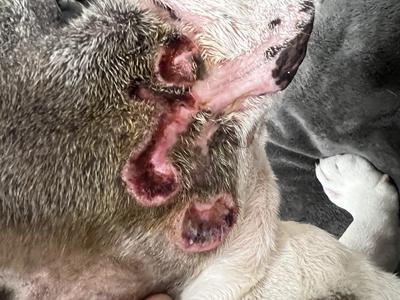Causes and Treatment of Sores on Dogs Face
by Amy Kendrick
(Baton Rouge, LA)

Right side of face
I have a 9yo F Olde English Bulldog, 60lbs. She was found in 2014 at a truck stop covered in chemicals. She has always had a terrible immune system and frequent trips to the vet are the norm. Since December 2022 she’s had these sores on her face. We treat it with Antibiotics and a topical steroid/antibiotic and it starts to heal but then comes back. My vet has just started on on another round of the same meds. Is there something we might be missing here? Could this be ringworm or a more serious bacterial or parasitic infection that these antibiotics wouldn’t work on? My next step is to have a biopsy done but I wanted to get other opinions as to what this could possibly be so that I’m prepared to ask my vet what to test for.
She is on Enrofloxacin 136mg 2 tabs 1x a day and
Animax 2xs a day (topical)
Could this be something as simple as ringworm?
Any and all suggestions and feedback is appreciated. Thank you for your time.
Editors Thoughts on Causes of Sores on a Dog's Face
Hi Amy,
Sorry to hear about the sore's on your dogs face. Here are some general thoughts to discuss with your veterinarian.
Given that the sores are localized to the face, this can provide some indications regarding their potential cause. Common facial afflictions in dogs include bacterial or fungal infections, demodex mites, autoimmune disorders, and contact dermatitis. The face is frequently affected because dogs often explore their environment with it, making it prone to various injuries, reactions, and infections.
Your dog's current treatments include:
Enrofloxacin: A broad-spectrum fluoroquinolone antibiotic effective against a range of bacterial infections.
Animax: A combination topical ointment containing an
Given these medications, your vet is addressing a broad range of potential causes, from bacterial infections to inflammatory conditions.
Now, regarding the possibility of ringworm:
Ringworm (dermatophytosis) is a fungal infection that can affect the face. It often presents as circular, patchy lesions with central hair loss. The edges might appear red and slightly raised. While Animax has antifungal properties, it might not be as effective against ringworm as other specific antifungal treatments.
If your Veterinarian suspects ringworm, that he or she will:
Take a Fungal Culture: A gold standard test where a sample from the lesion is cultured to identify the presence of the ringworm fungus.
Wood's Lamp Examination: Some strains of the ringworm fungus fluoresce under a Wood's lamp. However, a negative result doesn't exclude ringworm.
Microscopic Examination: A quick method to detect fungal elements, although it isn't as definitive as a culture.
If ringworm hasn't been specifically ruled out, it's advisable to discuss this with your vet, especially given the persistent nature of the sores despite treatment. It's also worth noting that dogs with compromised immune systems, like yours, might be more prone to infections like ringworm, and these infections can sometimes be more severe or challenging to treat in such cases.
You are doing the right thing, as a definitive diagnosis requires a hands-on evaluation by your vet.
Please keep us up to date on your dog's condition.
Jeff
Editor and Publisher
Dog Health Guide
Please note: This information is intended to complement, not replace, the advice of your pet's veterinarian. Always consult a vet for professional medical advice about your pet's health.
Join in and write your own page! It's easy to do. How? Simply click here to return to Skin.




